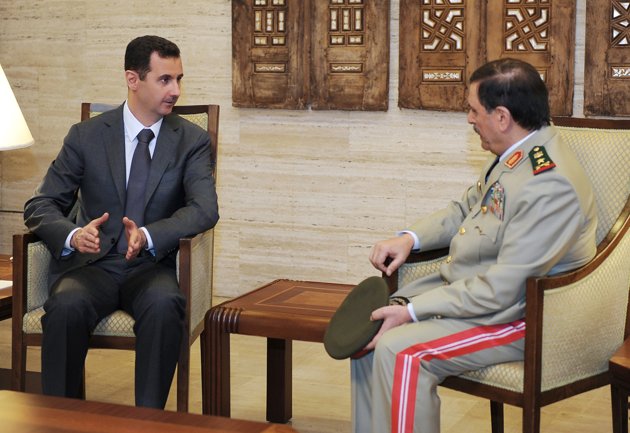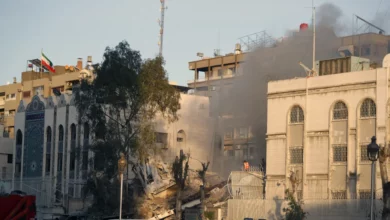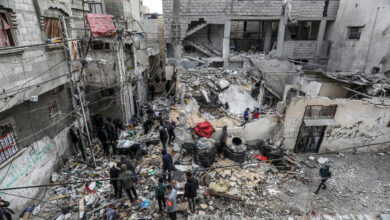
BEIRUT — Syrian President Bashar al-Assad made his first appearance since a brazen bomb attack killed three members of his inner circle while government troops launched a wide-ranging assault on Thursday to snuff out rebels throughout the capital Damascus.
Anti-regime activists said government troops used mortars, tanks and helicopter gunships against rebels throughout Damascus and its suburbs. But the military's failure to swiftly vanquish lightly armed rebel forces and the deadly bombing of a high-level security meeting a day earlier made Assad's hold on power look increasingly tenuous.
Amateur video showed rebels taking over the Bab al-Hawa border crossing with Turkey, where they stomped on portraits of Assad and his father and predecessor, Hafez Assad.
The whereabouts of Assad, his wife and their three young children have been a mystery since the attack that killed three top regime officials, including Assad's brother-in-law and the defense minister. Assad does not appear in public frequently, but his absence was notable following such a serious blow to his inner circle.
A brief state TV report showed Assad dressed in a suit and tie and swearing-in his new defense minister. It appeared aimed at sending the message that Assad is alive and well. The station said that he wished the new defense minister good luck, but did not say where the swearing-in took place.
Thousands of Syrians streamed across the Syrian border into Lebanon, fleeing as fighting in the capital entered its fifth straight day, witnesses said. Residents near the Masnaa crossing point — about 25 miles (40 kilometers) from Damascus — said hundreds of private cars as well as taxis and buses were ferrying people across.
Wednesday's rebel bomb attack struck the harshest blow yet to Assad's regime. The White House said it showed Assad was "losing control" of Syria.
Syrian TV confirmed the deaths of Defense Minister Dawoud Rajha, 65, a former army general and the most senior government official to be killed in the rebels' battle to oust Assad; General Assef Shawkat, 62, the deputy defense minister who is married to Assad's elder sister, Bushra, and is one of the most feared figures in the inner circle; and Hassan Turkmani, 77, a former defense minister who died of his wounds in the hospital.
Also wounded were Interior Minister Mohammed Shaar and Major General Hisham Ikhtiar, who heads the National Security Department. State TV said both were in stable condition.
Rebels claimed responsibility, saying they targeted the room where the top government security officials in charge of crushing the revolt were meeting.
Major General Robert Mood, the Norwegian head of nearly 300 unarmed UN observers in Syria, condemned the violence and encouraged a diplomatic solution, which appears increasingly out of reach.
"It pains me to say, but we are not on the track for peace in Syria," Mood said in Damascus.
Hours later, China and Russia vetoed a new UN Security Council resolution on Syria's crisis — reflecting divisions between them and the West on who is responsible for Syria's crisis and how to stop it.
The resolution would have imposed non-military sanctions against Assad's government if it didn't withdraw troops and heavy weapons from populated areas within 10 days. It was tied to Chapter VII of the UN Charter, which could eventually allow the use of force to end the conflict.
Russia and China have long opposed any moves that put the blame exclusively on Damascus or could pave the way for foreign military intervention in Syria.
The 11-2 vote, with two abstentions, leaves in limbo the future of the 300-person UN monitoring team in Syria, whose mandate expires Friday.
In the latest fighting in Damascus, government forces fired heavy machine guns and mortars in battles with rebels in a number of neighborhoods in the capital, the Britain-based activist group Syrian Observatory for Human Rights said.
"Intense fighting has been ongoing for five days in Damascus in frustrated attempts by the regime to regain rebel-held areas," said the Observatory.
The group reported intense clashes in a string of neighborhoods along its southern edge, the northeastern neighborhood of Qaboun, and in number of western suburbs.
Gunfire and booms from shelling could be heard throughout the capital, and streets in the hard-hit areas were largely empty, save for government troops or rebels.
"It is a war going on here, literarily a war," said a 25-year-old woman in the Muhajereen neighborhood. She said the sounds of battle had kept her up all night and she had stayed home from work because she feared random gunfire.
"It reminded me of that night when the Americans shelled Baghdad nine years ago," she said. "I was watching it on TV, but today I'm living a very similar situation."
Adding to the confusion, Syria's state news agency warned citizens that gunmen were disguising themselves in military uniforms to carry out attacks.
"Gunmen are wearing Republican Guard uniforms in the neighborhoods of Tadamon, Midan, Qaa and Nahr Aisha, proving that they are planning attacks and crimes," it said.
The Observatory, which relies on a network of activists inside Syria, said some 26 rebels and civilians were killed in Damascus and its suburbs, among more than 100 killed nationwide. At least 47 of the dead were government troops, it said.
Amateur videos posted online gave glimpses of the strife. One video showed dozens of dead and wounded men on the floor of a mosque in the area of Sayeda Zeinab, south of Damascus. An off-camera narrator says government helicopters fired on them on Wednesday. Another video showed what appeared to be at least 40 bodies wrapped in cloth and laid out in a mass grave.
Rebels made gains, according to other videos. Some showed dozens of fighters celebrating on three destroyed tanks in the northern town of Izaz, which they said they had seized from the regime.
Activist claims and videos could not be independently verified. The Syrian government bars most media from working independently in the country.
The unarmed observers were authorized for 90 days to monitor a ceasefire and implementation of Kofi Annan's six-point peace plan, but the truce never took hold and the monitors have found themselves largely locked down because of the persistent violence.
Mood said the observers "will become relevant when the political process takes off."
Syria's 16-month crisis began with protests inspired by the Arab Spring wave of revolutions, but it has evolved into a civil war, with rebels fighting to topple Assad.
Activists say more than 17,000 people have been killed since the uprising began in March 2011, most of them civilians. The Syrian government says more than 4,000 security officers have been killed. It does not given numbers of civilian dead.




